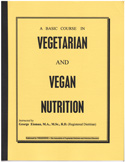Take a vitamin B12 supplement

Vitamin B12, also called
cobalamin, is made by bacteria and fungi.
Non-vegans get B12 from meat and dairy products. Animals eat
dirt and bacteria with
their food. That is how B12 gets into animal
flesh and milk. We wash
our vegetables. Washing them removes the dirt and the B12.
We need 2.4 mcg of B12 per day,
or about 17 mcg per week. Pregnant and nursing women need a little
more. Vegan
adults and children should take a B12 supplement
twice a week. We like the liquid or sublingual type, but tablets or
B12
fortified foods are fine too. Excess B12 is not toxic.
A B12
deficiency can be very serious. Symptoms can include macrocytic anemia,
nerve damage and eventual paralysis. B12 supplements are inexpensive
and easily available. Don't take any chances.
You may hear that vegans can get their B12 from tempeh, algae,
seaweed, or other plant foods. Do not rely on these sources. Some of
these foods contain B12 analogs. These analogs are similar to cobalamin
but they cannot be used by our bodies.
Maintain high vitamin D levels
Recent research
shows that vitamin D is very important for overall health. Most people,
including vegans, have blood levels that are too low. Protect your
health.
Learn the best
sources of vegan vitamin D.
Eat whole food sources of omega 3
fats
Experts in
vegan nutrition recommend that we eat 1 tsp to 1 Tbsp of
ground flax
seed every day. Flax seeds contain alpha-linolenic
acid, an omega 3 fat. Buy whole flax seeds
and grind them fresh daily. Use a coffee grinder. Brush the
ground flax seeds out of the grinder with a small pastry brush. It is
quick, and you won't have to wash the grinder every day.
Eat your ground
flax seeds right away or
freeze them in a dark, airtight container. Omega 3 fats are
very
fragile and they go rancid when exposed to
air, heat,
or light.
Whole flax seeds
are a good source of fiber and fiber helps satisfy our hunger!
Do
not use flax oil.
It may be rancid, and it is not a whole food.
Chia seeds,
walnuts and hemp seeds are other good sources of
omega 3 fats. Raw nuts
and seeds are nutritious but very high in fat. Keep them in the
freezer. Limit your
intake to one ounce of
nuts per day until you reach normal weight. One ounce is just
a small handful.
Consider taking DHA
(docosahexaenoic acid)

DHA is a long
chain fatty acid in the omega 3 group. It is an important
part of our brain, retina, and some cell membranes. Many people on a
low fat vegan diet can convert alpha-linolenic acid
to DHA. Others cannot convert enough to achieve optimum
health.
A shortage of
DHA may be related to depression, schizophrenia, Alzheimer's disease
and ADHD. Some doctors treat mental disorders with DHA
supplements. Vegan physicians recommend DHA for pregnant and
lactating women. Many other vegans take DHA as a preventive measure.
Do not eat fish
or take fish oil for DHA. If you decide to take DHA,
buy plant-source DHA that is made from algae.
The fish get it from the algae they eat. Adults should take about 200 -
300 mg per day.
Omega 3 fats thin
the blood slightly. If
you get too many omega 3's, you may find that you bruise or bleed
easily. If this happens, eliminate the supplements. It
probably
means that you obtain and convert all you need from leafy greens and
other plant foods.
A Basic Course in Vegetarian and
Vegan Nutrition

Most
accurate vegan nutrition information comes from vegan health
professionals. There is a vegetarian practice group of
dietitians in the American Dietetic Association. They distribute good
educational materials.
One book we like is A
Basic Course in
Vegetarian and Vegan Nutrition by George
Eisman, M.A.,M.Sc.,R.D. It is distributed by:
The Vegetarian
and Vegan Association
427 South
Franklin St.
Watkins Glen,
NY 14891
Becoming Vegan

Another
excellent book by two registered
dietitians is
Becoming
Vegan by Davis and Melina.
We recommend it highly.
Your
family physician and dietitian are not good sources of information.
In fact, they may be downright hostile about your decision to follow a
vegan diet.
Why is it hard
to find health professionals who
advocate a vegan nutrition plan?
- If they are meat-eaters, they probably have
personal biases that keep them from being objective.
-
Physicians know little about nutrition, and
absolutely nothing about vegan nutrition.
-
They may actually believe the propaganda
distributed
by the meat and dairy industries.







New! Comments
Have your say about what you just read! Leave us a comment in the box below.